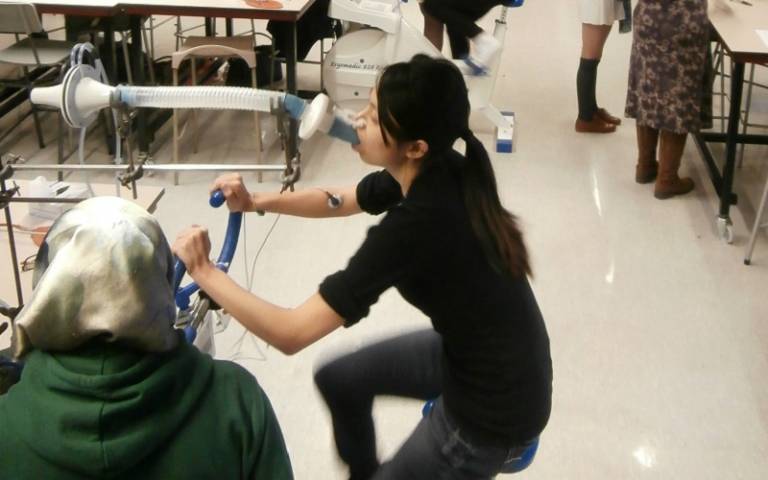Moving lab teaching online with LabTutor
UCL Medical School students working remotely during the Covid-19 pandemic are using specialist software to continue to analyse real-time data from equipment in the lab.

5 June 2020
Dr Pam Houston, Deputy Academic Lead MBBS Year One, UCL Medical School, describes how LabTutor VLE has enabled students to continue measuring and analysing lab-captured data from their own homes.
About LabTutor
LabTutor (AD Instruments) is an interface between our data capture equipment in the lab and a student friendly virtual learning environment (VLE). It is an online learning platform with ready-to-use content for life sciences, nursing, and medicine. The software allows our students to capture real-time data in the lab, on their blood pressure, heart rate, etc., but also a whole range of activities such as testing their vision, reflexes and even kidney function.
Students can use a group login in labs or remotly to work together to analyze their own physiological data. Over many years, this has allowed us to move to online materials, which our students prefer, and provide each student with digital lab reports at the end of each session.

LabTutor data

LabTutor: Check your understanding quiz
Currently we provide teaching on the LabTutor VLE for over 1500 student per annum within the Cruciform Teaching Facilities Unit (CTFU). Currently our LabTutor system is based solely in the CTFU, but with the updated cloud-based version of the system, UCL can continue to support existing lab provision running dual sessions; we can have some students in the lab doing their own recording and others can remotely access example data to analyse in real time. Thus the same experiments can run in both face-to-face and in remote environments simultaneously.
Where lab access is not possible, Lt will allow us to maintain lab teaching remotely with the same experiments and knowledge transfer our current teaching provides. But we do not want to just provide a status quo, this is the time when we can improve our provision with professional learning resources.
Monitoring student engagement and understanding
LabTutor also provides additional metrics of student attendance and engagement such as: participation, time-spend on task, marks accrued from pre- or post-lab sessions, and can alert staff to areas of misconception within the student body. Such metrics, which are currently important, will become essential with significant remote learning; allowing staff to reach out to students who may be struggling, and provide tailored support and encouragement in the current environment. This will also help us to maintain our excellent NSS scores and support our BAME awarding gap goals.
Maintaining research-based educational practice
At UCL we strive for research-led educational practice through the connected curriculum. Lab experiences are key to our educational practice, and we must continue to provide elements that make UCL such a thriving research intensive environment and prioritise our lab experiences for students.
The ability to move lab teaching online is not to erode the traditional face to face lab experience. In fact, our use of LabTutor has allowed for greater student engagement and has maintained the content provisions in our courses. With the Lt system, where we have been unable to expand our lab provision due to the capacity constraints of our teaching facilities, we will now be able to incorporate new and exciting lab content in the coming academic year.
The students can use the online tools to analyse either example or their own data within the VLE. The tools measure the onscreen data and the values are draged and dropped to the tables provided. This is then reinforced with questions to answer with model answers provided. The metrics allow us to see if the student checked the answer before recording their own answer, and we can set this so that the student commits their answer before checking the model answer.
Summary of the data recorded and questions and answers are included in the report sent to student for reflection.
Updated software
Within the Cruciform Dry labs, we have been using LabTutor for a number of years in Biosciences and MBBS teaching, but we are approaching the end of the current software’s lifespan as it has compatibility issues with Windows 10. Thankfully, we had already budgeted to update the software. The replacement is Lt, a cloud based system that will give us a range of options as we consider the remote and socially-distanced teaching requirements for the 2020-21 academic year.
The move to Lt - the cloud-based version of LabTutor - has become an imperative as UCL must continue to provide this resource across a range of Life Sciences, Medical Sciences and UPSCE programmes. The new version also has the capacity for remote teaching with example data. With example data, the students can still measure and analyse, while the same experiment can be run live if we have students on campus and lab time - a powerful tool if not all student can be on campus together!
Whilst teaching face-to-face and remote groups simultaneously (also called 'hybrid' or 'dual' teaching) has drawbacks and is not recommended in most circumstances, there may be instances where it is advantageous. Enabling remote students to access real-time data sets being produced by students in the lab is one such exception.
 Close
Close

